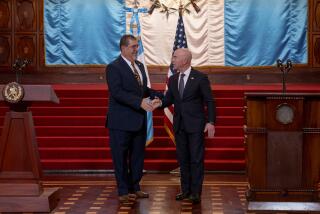Guatemalans in U.S. Seek Unity, Healing
- Share via
Twenty years after events in Guatemala propelled a mass exodus of its citizens northward to the United States, a group of Guatemalan American leaders met Saturday in the San Gabriel Valley to take a tentative first step toward establishing a national organization in their adopted country.
Immigrant leaders from Miami, Washington and other cities formally established the National Congress of Guatemalan Organizations, a milestone in the history of the rapidly growing Central American community. An estimated 1 million to 1.5 million Guatemalans are in the United States.
“We have to unite . . . so that we can have political influence in this country and be a part of this society,” said Julio Villasenor, a Realtor and founder of the Guatemalan Unity and Information Agency in Los Angeles, one of a dozen community organizations represented at the weekend summit.
The two-day meeting at a Baldwin Park hotel brought together representatives from the array of groups that have formed in Guatemalan neighborhoods across the United States. There were delegates from the Guatemalan Soccer League of Washington, D.C., the Guatemalan-American Committee of Long Island, and the Guatemalan Education Action Project, a Los Angeles-based human rights group.
Romeo Avila, a delegate from San Francisco, said he hoped that the new national congress would mark the end of a long period of fear and apathy among Guatemalan immigrants in the United States.
“There’s a lot of people who are afraid, who have been terrorized” in Guatemala, he said. “That’s why we haven’t been able to organize.”
Like other groups formed by immigrants and ethnic minorities throughout U.S. history--including the National Assn. for the Advancement of Colored People and the Mexican American Legal Defense and Educational Fund--the National Congress of Guatemalan Organizations has outlined a broad list of goals that fit under the rubric of “community empowerment.”
Leaders say they hope to promote education through scholarships for young people. There is talk of establishing a political action committee that would exist apart from the nonprofit organization.
The preamble to the group’s bylaws proclaims: “We must build community power to ensure that the voice [of the congress] is heard at every level of government to create economic opportunity and foster social justice.”
Achieving these goals won’t be easy, many delegates said, given the continuing divisions among Guatemalans in this country, most of which can be traced to the recent civil war in their native land. (A peace treaty between the government of President Alvaro Arzu and Marxist guerrillas ended the war in 1996.)
“Here in the U.S., we’re still trapped in the 1980s, we’re still trying to fight the Cold War,” said Edgar R. Ayala, president of the San Francisco-based Asociacion de Guatemaltecos Unidos.
Ayala, a self-described “progressive” and longtime opponent of military rule in Guatemala, said he was willing to put aside old differences and sit alongside Guatemalans from the opposite end of the political spectrum.
Cesar A. Orantes, a Guatemalan intellectual and longtime activist in Republican Party politics in Alexandria, Va., said he too was willing to look past old enmities.
“We want to be friends and brothers and fight together now,” he said.
Still, a few delegates said they were concerned about the political past of some of the leaders most active in the formation of the congress, suggesting they were linked to Guatemala’s right-wing political parties.
Despite such concerns, the 40 or so delegates at the convention went about their work without much disagreement.
After opening Friday’s meeting by standing for both the U.S. and Guatemalan national anthems, they quickly moved to their first task, approving the new organization’s bylaws.
“This is something we should celebrate and remember for the rest of our lives,” said Rico Ortiz, 45, of Azusa, a member of the Assn. of Guatemalan Fraternities, a cultural organization.
“To be part of this first congress of Guatemalans is a great honor,” he said. “Let’s hope it’s just the beginning.”
More to Read
Sign up for Essential California
The most important California stories and recommendations in your inbox every morning.
You may occasionally receive promotional content from the Los Angeles Times.











